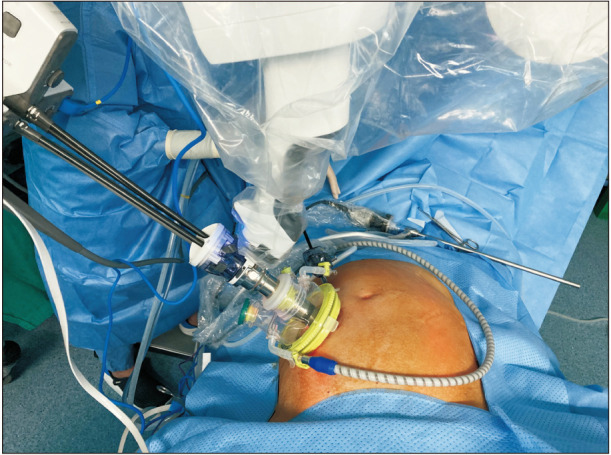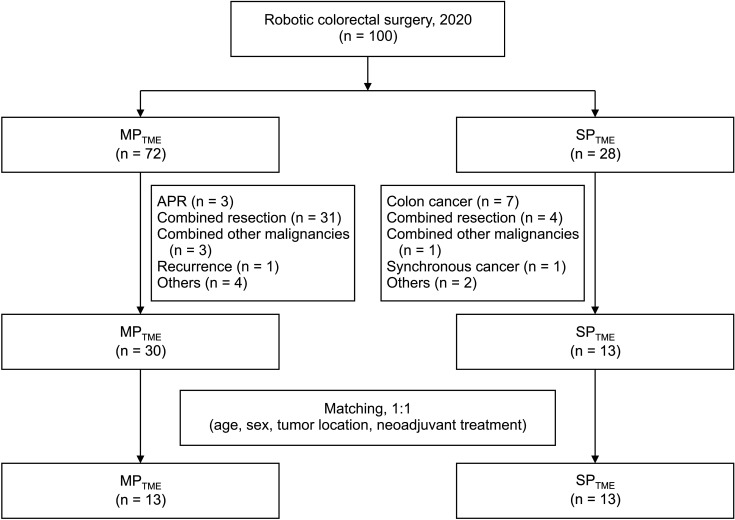Ann Surg Treat Res.
2023 Aug;105(2):99-106. 10.4174/astr.2023.105.2.99.
Single‑port versus multiport robotic total mesorectal excision for rectal cancer: initial experiences by case‑matched analysis of short‑term outcomes
- Affiliations
-
- 1Colorectal Cancer Center, Kyungpook National University Chilgok Hospital, School of Medicine, Kyungpook National University, Daegu, Korea
- KMID: 2545161
- DOI: http://doi.org/10.4174/astr.2023.105.2.99
Abstract
- Purpose
The da Vinci single-port (SP) system has been used in various surgical fields, including colorectal surgery. However, limited experience has been reported on its safety and feasibility. This study aims to evaluate the short-term outcomes of SP robotic surgery for the treatment of rectal cancer compared with multiport (MP) robotic surgery.
Methods
Rectal cancer patients who underwent curative resection in 2020 were reviewed. A total of 43 patients underwent robotic total mesorectal excision (TME), of which 26 (13 in each group, SPTME vs. MPTME) were included in the case-matched cohort for analysis. Intraoperative and postoperative outcomes and pathological results were compared between the 2 groups.
Results
Median tumor height was similar between the 2 groups (SPTME vs. MPTME : 5.9 cm [range, 2.2–9.6 cm] vs. 6.7 cm [range, 3.4–10.0 cm], P = 0.578). Preoperative chemoradiotherapy was equally performed (38.5%). The median estimated blood loss was less (20.0 mL [range, 5.0–20.0 mL] vs. 30.0 mL [range, 20.0–30.0 mL], P = 0.020) and the median hospital stay was shorter (7 days [range, 6–8 days] vs. 8 days [range, 7–9 days], P = 0.055) in the SPTME group. Postoperative complications did not differ (SPTME vs. MPTME : 7.7% vs. 23.1%, P = 0.587). One patient in the SPTME group and 3 in the MPTME group experienced anastomotic leakage.
Conclusion
SP robotic TME showed perioperative outcomes similar to MP robotic TME. The SP robotic system can be considered a surgical option for the treatment of rectal cancer. Further prospective randomized trials with larger cohorts are required.
Keyword
Figure
Reference
-
1. Jones R, Dobbs RW, Halgrimson WR, Vigneswaran HT, Madueke I, Wilson J, et al. Single port robotic radical prostatectomy with the da Vinci SP platform: a step by step approach. Can J Urol. 2020; 27:10263–10269. PMID: 32544051.2. Van Abel KM, Yin LX, Price DL, Janus JR, Kasperbauer JL, Moore EJ. One-year outcomes for da Vinci single port robot for transoral robotic surgery. Head Neck. 2020; 42:2077–2087. PMID: 32190942.
Article3. Park HS, Lee J, Lee H, Lee K, Song SY, Toesca A. Development of robotic mastectomy using a single-port surgical robot system. J Breast Cancer. 2020; 23:107–112. PMID: 32140275.
Article4. Lee YS, Kim JH, Kim HJ, Lee SC, Kang BM, Kim CW, et al. Short-term outcomes of single-port versus multiport laparoscopic surgery for colon cancer: the SIMPLE multicenter randomized clinical trial. Ann Surg. 2021; 273:217–223. PMID: 32209897.
Article5. Luján JA, Soriano MT, Abrisqueta J, Pérez D, Parrilla P. Single-port colectomy vs multi-port laparoscopic colectomy: systematic review and meta-analysis of more than 2800 procedures. Cir Esp. 2015; 93:307–319. PMID: 25687624.
Article6. Marks JH, Salem JF, Anderson BK, Josse JM, Schoonyoung HP. Single-port robotic left colectomy: first clinical experience using the SP robot (rSILS). Tech Coloproctol. 2020; 24:57–63. PMID: 31832798.
Article7. Marks JH, Kunkel E, Salem J, Martin C, Schoonyoung HP, Agarwal S. rSILS: initial clinical experience with single-port robotic (SPr) right colectomy. Tech Coloproctol. 2020; 24:817–822. PMID: 32451805.
Article8. Kneist W, Stein H, Rheinwald M. Da Vinci single-port robot-assisted transanal mesorectal excision: a promising preclinical experience. Surg Endosc. 2020; 34:3232–3235. PMID: 32394173.
Article9. Choi MS, Yun SH, Oh CK, Shin JK, Park YA, Huh JW, et al. Learning curve for single-port robot-assisted rectal cancer surgery. Ann Surg Treat Res. 2022; 102:159–166. PMID: 35317355.
Article10. Ryu HS, Kim J. Current status and role of robotic approach in patients with low-lying rectal cancer. Ann Surg Treat Res. 2022; 103:1–11. PMID: 35919115.
Article11. Park JS, Choi GS, Lim KH, Jang YS, Jun SH. Robotic-assisted versus laparoscopic surgery for low rectal cancer: case-matched analysis of short-term outcomes. Ann Surg Oncol. 2010; 17:3195–3202. PMID: 20589436.
Article12. Kim HJ, Choi GS, Song SH, Park JS, Park SY, Lee SM, et al. An initial experience with a novel technique of single-port robotic resection for rectal cancer. Tech Coloproctol. 2021; 25:857–864. PMID: 34052901.
Article13. Kim HJ, Choi GS, Park JS, Park SY. Multidimensional analysis of the learning curve for robotic total mesorectal excision for rectal cancer: lessons from a single surgeon’s experience. Dis Colon Rectum. 2014; 57:1066–1074. PMID: 25101602.
Article14. Bae SU, Jegon WK, Baek SK. Single plus one-port robotic surgery using the da Vinci single-site platform versus conventional multi-port laparoscopic surgery for left-sided colon cancer. Wideochir Inne Tech Maloinwazyjne. 2022; 17:179–187. PMID: 35251404.
Article15. Marks JH, Montenegro GA, Shields MV, Frenkel JL, Marks GJ. Single-port laparoscopic colorectal surgery shows equivalent or better outcomes to standard laparoscopic surgery: results of a 190-patient, 7-criterion case-match study. Surg Endosc. 2015; 29:1492–1499. PMID: 25277473.
Article
- Full Text Links
- Actions
-
Cited
- CITED
-
- Close
- Share
- Similar articles
-
- Robotic Total Mesorectal Excision for Rectal Cancer: Current Evidences and Future Perspectives
- Robotic Surgery for Rectal Cancer: An Update in 2015
- Initial experience of abdominal total mesorectal excision for rectal cancer using the da Vinci single port system
- Robotic Versus Laparoscopic Surgery for Rectal Cancer after Preoperative Chemoradiotherapy: Case-Matched Study of Short-Term Outcomes
- Robotic Total Mesorectal Excision using a Wristed Suctionirrigation Device for Efficient Traction and Visualization



